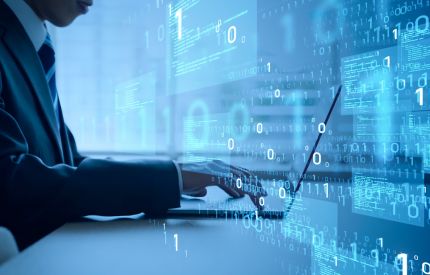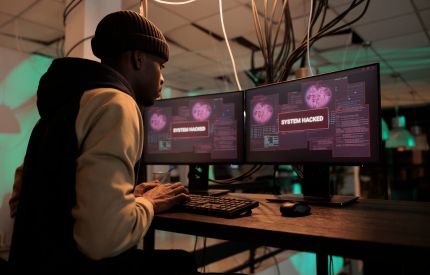Safeguarding Indonesia
Democracy in the 2024 Elections

Indonesia’s 2024 General Elections from lab45.id
As Indonesia stands on the precipice of the crucial presidential and parliamentary elections on February 14, 2024, safeguarding our democratic process is not just about securing ballot boxes but also about protecting our digital landscape.
In an era dominated by technology, the looming threat of cyberattacks poses a significant challenge, demanding our attention and collective vigilance. This article aims to unravel the intricacies of cyber threats, shedding light on potential risks, sharing real-life examples, and offering practical tips to fortify our digital democracy.
Demystifying a spectrum of cyber threats
Digital disinformation campaigns
Beyond spreading false narratives, cyber attackers may orchestrate sophisticated disinformation campaigns to sway public opinion. Manipulative content can surface across various online platforms, making it essential for citizens to critically evaluate information and distinguish fact from fiction.
Phishing expeditions
Phishing attacks extend beyond deceitful emails to include fraudulent websites and malicious messages. As the election season unfolds, cybercriminals may exploit the excitement, sending phishing lures that mimic official communication. Vigilance and scepticism are crucial to thwart these digital fishing expeditions.
Ransomware strikes
The threat of ransomware is not confined to encrypting files; it extends to disrupting critical systems integral to the election process. A well-timed ransomware attack could cripple election infrastructure, highlighting the importance of robust cybersecurity measures to ensure the integrity of the electoral system.
Deep fake manipulation
Deepfake technology allows malicious actors to create realistic yet entirely fabricated audio and video content. During the election, politicians and public figures could be targeted with manipulated media, leading to misinformation and potential reputational damage. Awareness and media literacy are vital defences against this evolving threat.
Denial-of-Service (DDoS) attacks
Imagine a traffic jam on the digital highway. DDoS attacks can overwhelm online platforms, rendering them inaccessible. Political party websites, news outlets, or election commission portals may become targets, disrupting the flow of information. Ensuring the resilience of digital infrastructure is essential to counter these virtual traffic jams.
Real stories, real lessons
The social media storm (2016 US election)
The 2016 US presidential election showcased the potency of disinformation campaigns on social media platforms. Understanding the impact of such campaigns emphasises the need for a digitally literate electorate.
NotPetya’s ripple effect (2017)
The NotPetya ransomware attack in Ukraine demonstrated the interconnected nature of cyberspace. It underscored the importance of securing critical infrastructure against ransomware threats to protect national interests.
Practical steps for digital democracy
Media literacy education
Equip citizens with the skills to critically evaluate information, identify manipulated content, and discern the credibility of sources. Media literacy is a powerful tool against the spread of disinformation.
Enhanced cyber hygiene
Elevate cybersecurity practices by regularly updating software, employing robust antivirus solutions, and securing networks. A well-protected digital environment is more resilient against various cyber threats.
Multi-Factor Authentication (MFA)
Implement MFA across platforms to add an additional layer of protection against unauthorised access. This simple step can significantly enhance the security of personal and official accounts.
Collaborative threat intelligence
Foster collaboration between government agencies, political entities, and cybersecurity experts to share threat intelligence. Proactive information sharing can strengthen defences against evolving cyber threats.
Final thoughts
In the delicate dance between democracy and technology, comprehending the spectrum of cyber threats is imperative. By promoting digital awareness, enhancing cybersecurity practices, and fostering a resilient and vigilant digital community, Indonesia can navigate the cyber seas with confidence.
Let the 2024 elections stand as a testament to our commitment to a fair, transparent, and secure democratic process, both in the physical and virtual realms. Together, let’s fortify the heart of our democracy.
*This article has been published on e27.co on January 25, 2024
Protect your organisation from cybercrime and cyber threats today with just one click!
See our pricing here and request a demo to understand further.
You can also contact our sales to help you choose the right cybersecurity services for your business.

Written by:
Bernadetta Septarini (Content Marketing). Experienced content marketing and social media in the information technology and services industry.
Share this post
Related Posts

Earth Day: The Connection of Cybersecurity and Sustainability
- 22 Apr 2024
- By:Fanny Fajarianti
- Category: ArmourHacks
Uncover the link between Earth Day and Cybersecurity, promoting sustainability through data protection and environmental stewardship. Let’s secure a greener future.

What is DevSecOps? Definition & Best Practices for Tech Industries
- 18 Apr 2024
- By:Bernadetta Septarini
- Category: ArmourHacks
Learn about DevSecOps, principles, and best practices for the tech industry. Integrate security seamlessly into software development and enhance quality.

Safeguarding Your Organisation During the Hari Raya Holiday
- 09 Apr 2024
- By:Bernadetta Septarini
- Category: ArmourHacks
Protect your organisation from holiday cyberattacks during Hari Raya. Learn more about the risks and best practices for holiday security with ArmourZero.

Cyberattacks: A Growing Threat to Higher Education
- 02 Apr 2024
- By:Fanny Fajarianti
- Category: ArmourHacks
Universities hold sensitive data but face cyberattack risks in the digital age. Explore the impact of cyberattack and learn how to protect your institution.

